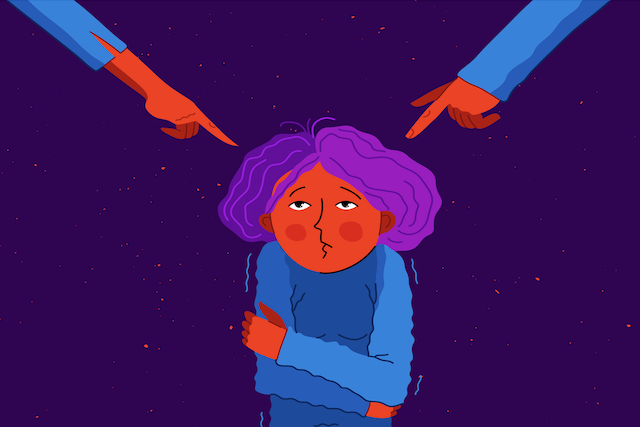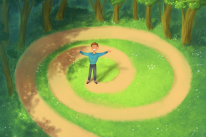
“Peace cannot be kept by force; it can only be achieved by understanding.” ~Albert Einstein
Most of us feel judged at times. We might feel judged for the way we look, the things we do (or don’t do), the things we say (and the way we say them), or for the things we believe.
We might respond to feeling judged by retreating inside ourselves, hiding, and silencing our voice, or we might react in defense or retaliation as if we’re being attacked.
It doesn’t feel good to feel judged. It can hurt, make us feel like we’re not good enough, and drain our energy.
But if we want to be free of the heavy burden of feeling judged, there’s something very important we need to understand.
Feeling judged and being judged are not the same thing!
This is such an important distinction. And understanding it can make the difference between feeling insecure or stable.
It’s the difference between hiding and shining.
Feeling Judged vs. Being Judged
When we feel judged, it’s something we experience inside ourselves.
It’s a feeling, not necessarily a fact.
It’s important to understand that how we feel and react to others is up to us. It’s a result of our conditioning, traumas, fears, emotions, insecurities, attitudes, and the things we believe (whether they’re actually true or not), but it’s ours.
It may be triggered by what someone says, but the feeling is still ours.
Being judged is something else. It’s something people outside of us do. Whether someone passes judgment on us through their words, actions, a certain look, or a sneering sound under their breath, it’s an external thing… and we can react to it, or not.
I’m not suggesting it’s easy to not react or take it personally, but understanding the distinction is important.
Taking Things Personally
If someone questions something we’ve said or done or why we believe something, we might take it personally and feel like that person is judging us.
Have you ever felt judged because someone asked you a question?
Be honest!
We might act defensively or angrily when someone questions something we believe, but that person may genuinely want to understand us better.
If we’re insecure about who we are, or if our sense of self is deeply attached to our beliefs, then any question can feel like an attack or judgment.
But that doesn’t mean it was a judgment.
I’m a very curious person. I’ve always been curious to understand myself, my mind and emotions. I know this comes through self-inquiry—meaning to question myself and my beliefs—and sometimes that is uncomfortable.
But it’s more than just understanding myself, it’s a curiosity to understand the human experience. This also means understanding others. This curiosity to understand is also the desire to connect on a deep, authentic level.
As Thich Nhat Hanh said: “Understanding is love’s other name. If you don’t understand, you can’t love.”
Because of who I am and what I do, I often ask people questions about who they are and why they believe what they believe.
Most of the time I’ve found people are quite open with me; however, occasionally people take my questions personally. Now, I know I had no sense of judgment in my questions, only my curiosity to understand and connect, yet there are times when the people I’m talking to become defensive.
Even though I understand, when this happens, I can sometimes still feel a sense of being judged. Judged for something I didn’t do. But this is my reaction. I perceive their reaction as a judgment for my perceived judgment.
I know, it sounds a little complicated, but that’s what happens sometimes. If I catch myself and feel what’s happening inside, I’m able to move through it and let it go.
But it starts with recognizing and being mindful of my reaction.
We Have a Choice
In times when we feel judged, we can react, defend, and justify our emotions by trying to blame someone else, or we can use it as an opportunity to be curious about ourselves—to understand so we can learn and grow.
Choosing to grow does not mean we don’t feel our emotions. We do. We feel them, and it can be uncomfortable at times. But choosing to grow means we feel our emotions consciously and recognize our reactions so we can take responsibility for them. Because we understand our emotions and reactions are ours.
As long as we try to blame others for how we feel, we will always be the victim, because it will feel like we don’t have a choice.
By learning to own our emotions by being present with them, we have the power to transform our relationship to them. We can then learn to navigate the landscapes of our mind.
Let Go by Being Curious
If you’re feeling judged—assuming someone is thinking badly of you and feeling bad about yourself in response—engage your curiosity.
Follow your emotions mindfully. Just feel them. Be present with them (to the degree that you are able). Let them take you deeper into yourself.
Ask yourself:
Why do I feel judged?
What beliefs am I holding onto?
What do I not want to see about myself?
What do I not want to admit?
Am I judging myself? If so, for what?
Why does it matter what someone else thinks?
Don’t underestimate the power of our curiosity. It’s a superpower!
It really can shift us from a closed and reactive state of mind into an open and receptive state of mind. Open and receptive is the place where we can break our self-imposed limits, connect to our heart, and grow.
It’s also the place where understanding becomes love. Both within ourselves and within our relationships and interactions. It’s the place where we can heal our collective separation and bring back a sense of unity.
Curiosity is the magic that can facilitate it.
Journaling is a great assistant to curiosity. It helps us connect more deeply to what’s happening inside us. Any time you feel judged, take some time to sit quietly and reflect on your emotions, thoughts, and feelings. Writing them down can help to make it more tangible.
Do this enough and you’ll start to see familiar patterns emerging.
Find Your Strength
It’s likely that people will judge you at some point. But remember, that doesn’t mean you have to take it personally or feel bad about yourself.
Whenever you’re feeling judged, whether someone else is judging you or not, remember, it’s just a feeling. Use these times as opportunities to deconstruct your limits and insecurities.
By doing this you connect with your true self and allow the strength of your heart to emerge.
And the world needs your heart to shine!
About Ben Fizell
Ben is a meditation and mindfulness teacher, stillness coach, nature lover, a curious and heart centered human being with a vision – the Peacekeeper Project. Ben provides education and training to help people quiet their mind so they can live from their heart. Learn more and access a free meditation course at Peacekeeper Project. You can also follow on YouTube, Instagram, Facebook.
- Web |
- YouTube |
- More Posts












 Though I run this site, it is not mine. It's ours. It's not about me. It's about us. Your stories and your wisdom are just as meaningful as mine.
Though I run this site, it is not mine. It's ours. It's not about me. It's about us. Your stories and your wisdom are just as meaningful as mine.
Simple yet very relatable. thank you author. I wanted to write something like this. Truly appreciate your article.
Life would be so much easier if we didn’t care what other people think. Let’s not waste any more time worrying and just live our own individual lives.
Amy, again! I do believe we’d be fast friends.
I’m fortunate to not really care what other people think. It made me an outcast in High School. I am affected by it, but I’ve never taken it to heart.
Not taking things personally is one of “the Four Agreements” : a book by Don Miguel Ruiz.
I think it is an important lesson, so thanks for your article and sharing your wisdom.
😂!
I try not to take things personally but it depends on who it is .